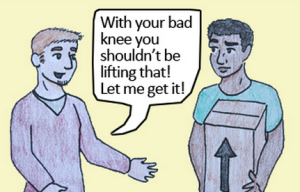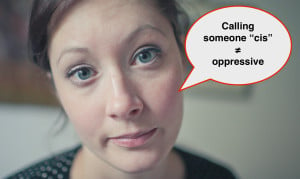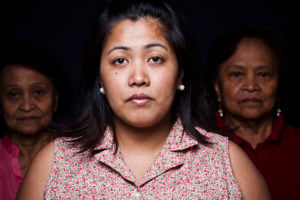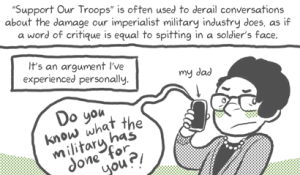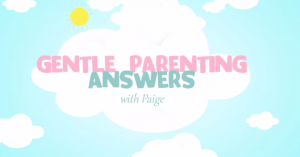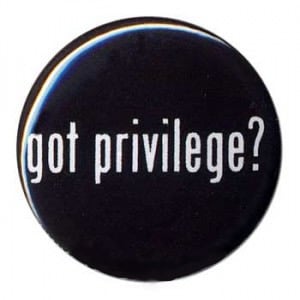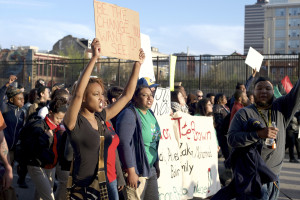
Source: iStock
Nothing has ever stopped me dead in my tracks like the first student protest I ever witnessed.
In the midst of charging across campus – head down, determined not to be late to class – I heard the distinct chorus of angry chanting and was soon greeted by the sight of homemade signs and megaphones.
These activists had neither the shield of a screen nor protection of relative anonymity. They were loudly, persistently, and unapologetically airing their concerns and demanding change.
And as someone who realized her feminist identity online, whose small, Ohio hometown hardly boasted a community of on-the-ground activists, I was awed and inspired. I immediately wanted to join them.
Yet it took me months to finally find the courage to attend a meeting.
My peers’ efforts to organize creative protests, form coalitions, and directly challenge our administrators intimidated me – and I worried that my lack of experience and general introversion would only hold them back.
My pre-occupation with meeting a perfect activist standard, however, turned out to be the least of my problems as a campus activist. I was warmly welcomed into the community, but quickly found that others on campus, and even beyond it, were hardly as accepting.
From college administrators to cultural critics to the mainstream media and beyond, plenty have questioned and even discredited the current wave of campus activism. Activists are frequently depicted as irrational, emotional, and driven by self-centered entitlement.
I found this firsthand.
When I started to claim my activist identity, my peers frequently responded to my proclamation with eye rolls. The activist identity, it seemed, was viewed as a pretentious phase – much the way hipsters were similarly derided on my largely preppy campus.
Plenty of people clearly thought activism was something I was “experimenting with” or “going through” for the sake of my own development.
But this was far from the truth. My fellow campus activists and I devoted significant time and energy on top of our academic pursuits and personal lives to do what we saw as critical social justice work that extended beyond any one of us.
While we were certainly emotionally invested in this work, our feelings didn’t drive or shape it: We educated ourselves about historical tactics and carefully considered the most effective courses of action.
Reasonably, members of activist communities on campuses across the country are tired of having to defend themselves against unfounded and misguided myths about their work.
So here are why some of the most common (and offensive) criticisms waged against these community leaders are so problematic – and how activists can overcome them.
1. “College Is Not Day Care”
“Oklahoma Wesleyan is not a ‘safe place,’ but rather, a place to learn,” Oklahoma Wesleyan University President Everett Piper wrote on the college’s website in November.
Piper wrote this in response to a student who expressed feeling offended by a homily on love after a university chapel service.
But rather than even entertain the possibility that the text itself was flawed, and the student’s complaint valid or at least worth critically engaging, the President concluded that rather than “blame others for everything that’s wrong with them,” students “need to grow up.”
“This is not a day care,” he concluded. “This is a university.”
Far too many seem to interpret students’ complaints about the content they’re taught or behaviors on campus that perpetuate microaggressions as evidence that they’re coddled – that they simply aren’t “tough” enough to deal with others’ ignorance or ill-will.
But this mentality grossly undermines how detrimental these lived experiences can be for students.
In fact, studies show that microaggressions can have very real detrimental effects on recipients’ mental health.
As Derald Wing Sue, author of “Racial Microaggressions in Everyday Life: Race, Gender, and Sexual Orientation,” wrote in Psychology Today, “The burden of constant vigilance drains and saps psychological and spiritual energies of targets and contributes to chronic fatigue and a feeling of racial frustration and anger.”
Framing students’ attempts to express and push back on this psychological damage as superfluous only reiterates and perpetuates the mentalities of inequality at their root.
Take, for example, the influx of bathroom bans facing transgender students across the country.
Sixteen-year-old Gavin Grimm, a transgender high school student at the center of a case against his Virginia school board’s ban, explained just how damaging facing this ban has been.
In addition to the physical discomfort of attempting to make it through a seven-hour school day without using the bathroom at all rather than use the incorrect bathroom, Grimm explained how the experience felt personally “othering.”
“It sort of puts a magnifying glass on my already existing conflicts with my gender identity and physical sex,” Grimm told MSNBC, adding he is fighting this legislation not just “because I’m thinking solely about myself; I’m doing this also in the hopes that it might help anyone else.”
Both this physical and psychological discomfort are not only unacceptable in and of themselves, but actively prohibit students like Grimm from reaching their full potential by creating unnecessary distractions.
But microaggressions need not necessarily infringe on one’s legal rights to be damaging and unacceptable.
For example, as a student at Barnard, a women’s college that shared classes and other facilities with Columbia University, my peers and I frequently faced gender-based microaggressions.
The phrase “Barnard to bed, Columbia to wed” was one we were introduced to as first-years, for example, and mansplaining was rampant in our co-ed classes. Especially as an anti-sexual assault activist, I frequently confronted deeply gendered victim-blaming attitudes.
Facing these attitudes was more than just annoying. It severely impacted my self-conception and feeling of worth on my own campus.
Knowing that many of my peers inherently saw me as less than worthy because of my gender and collegiate affiliation shaped the way I behaved in class. Knowing that many individuals on my campus truly believed women were to blame for violent attacks waged against them made me feel unsafe.
These attitudes strongly shaped the way I socialized with my peers, behaved in class, and acted in so many other routine scenarios on campus.
Students’ requests that their administrators address these attitudes is hardly asking for unnecessary, additional care, but requests for their basic, health-based rights are essential to pursuing their education to the best of their ability.
2. “You Should Be Grateful to Have This Opportunity At All”
There is a persistent myth in the US that college should not only be the greatest four years of one’s life, but is a crucial “opportunity” for individuals to succeed – and that anybody who doesn’t wholly buy into this mindset is ungrateful.
But this myth hardly jives with reality.
In fact, studies show that going to college hardly offers the type of return on investment that it once did. Skyrocketing tuition costs and the subsequent immense debt with which most students are saddled more often than not renders a college education less of an “opportunity” than a lifelong financial burden.
Yet in exchange for this significant financial investment, many students can expect to face marginalization, discrimination, and violence.
What’s more, colleges often directly financially exploit their students: Columbia University students, for example, recently protested the fact that the college paid working students wages below $15/hour.
Rather than ask students to be grateful for their debt and discrimination, colleges would do well to recognize that their students have significantly invested in their institution – and at the very least deserve the ability to live on campus free from discrimination or oppression and have their concerns respectfully addressed should this ability be challenged.
“As customers, when we don’t like the product, we complain,” one Ithaca College student activist told Fusion. “When a manager keeps ignoring what the customers are complaining about – there’s a problem.”
Ideally, education should be a basic right and the dynamics surrounding it, including students’ relationships with administrators, far from transactional. But the current reality is that students make a significant financial commitment to their education.
Pursuing this education is a choice that deeply impacts not only students’ future professional opportunity, but many of their personal choices – from when to get married (and who to marry) and/or start a family to where and how they live their daily lives.
Demanding that this personally impactful experience be one free from discrimination, and furthermore based on their demands as customers, is completely reasonable.
3. “Stop Complaining”
This past November, students at Yale University protested the racist and culturally appropriative Halloween costumes that were prevalent on their campus.
While students of course took issue with these costumes themselves, they also noted that they were ultimately protesting a much deeper issue.
“The protests are not really about Halloween costumes or a frat party,” Yale student Aaron Lewis wrote for Quartz in November. “They’re about a mismatch between the Yale we find in admissions brochures and the Yale we experience every day. They’re about real experiences with racism on this campus that have gone unacknowledged for far too long.”
Yet this specific incident – as well as many similar ones – were called “whining” and “obnoxious” by critics.
One Yale administrator went so far as to bemoan the protest as the end of an era in which students could be “a little bit inappropriate” and even “offensive.”
“American universities were once a safe space not only for maturation, but also for a certain regressive, or even transgressive, experience; increasingly, it seems, they have become places of censure and prohibition,” Erika Christakis, Associate Master of Yale University’s Silliman College, wrote in an e-mail (before ultimately resigning).
This interpretation not only undermines students’ personal experiences, but reveals the broader climate of resistance and dismissal they routinely face. It’s an attitude that extends to plenty of other campus issues.
My fellow anti-sexual assault activists and I, for example, were frequently discredited and viewed as complaining about ultimately superficial issues. Our criticism of inadequate consent education classes or evidence of toxic masculinity in fraternity culture were often discounted on face value, and viewed as feminist “political correctness,” rather than genuine attempts to point out opportunities to address systemic issues.
Minimizing students’ enraged responses to blatantly racist, sexist, or otherwise problematic actions and events simultaneously bolsters and normalizes the destructive attitudes at the heart of these incidents themselves.
4. “You’re Attacking Others’ Right to Free Speech”
Not only are the events or problems activists protest minimized, but activists themselves also framed as infringing on the rights of others.
Seeking to end racist, sexist, or otherwise discriminatory actions or attitudes can effectively infringe on the “rights” of those perpetuating them, according to some.
“Moral voices can also become sanctimonious bullies,” Nicholas Kristof wrote in the New York Times in November.
The attempts of some activists – like Wesleyan students’ attempt to cut funding for the student newspaper that criticized Black Lives Matters or Mount Holoyoke’s decision to cancel “The Vagina Monologues” because it excluded transgender women – infringed on the rights of students whose beliefs aligned with those events, he argued.
Of course, Kristof is known for perpetuating problematic mentalities – he has even gone so far as to claim his readers will only care about issues in non-Western nation is if it’s presented to them through the lens of a Western protagonist, for example. But Kristof isn’t the only one who has argued this point: Many others have pushed back on student activism under this guise, too.
Focusing on the “right” to speech is ultimately a surface-level distraction from a much more systemic problem.
While everyone may have the right to free speech in this nation, they are not protected from the consequences of that speech, especially if that speech is indicative of deeper, tangibly damaging attitudes.
Those who express hate speech, therefore, should rightfully face not only backlash from activists and others they’ve offended, but significant educational or correctional recourse.
What’s more, these consequences should hardly be interpreted as an attempt to curb the right to free speech, but an attempt to end hate speech and otherwise discriminatory attitudes and behaviors.
How to Move Past It
The willful ignorance and privilege inherent to each of these criticisms is undeniably, endlessly frustrating.
It’s easy for activists to feel discouraged by the prospect of creating systemic change on their campuses when they struggle to make those in position of power even understand how damaging and serious their grievances are in the first place.
But as the old adage goes, change doesn’t happen overnight. It requires activists to persistently point out these incidents, and refuse to tacitly accept them, when they do happen.
One of the keys to pick your battles, and learn when engaging with critics or opponents is a productive use of energy.
I certainly ran into the trap of exhaustively attempting to defend my activist work to individual, resistant people in my dorm or classes. While doing so may seem like a necessary task at the time, I soon found it ultimately proved less useful than devoting my energy to broader efforts.
It may have felt like giving up in the moment, but I eventually found that sometimes the right choice is to walk away from a fight.
Additionally, while “self-care” has become something of a buzzword in activist communities, it has for a reason.
So many activists do this often deeply personal and challenging work on top of many other obligations and quickly burn out. Taking breaks, and taking time for oneself apart from this work, is crucial to sustaining it.
Finally, community is key.
One of the most beautiful aspects of my campus activist work was connecting with like-minded individuals and entering into a group I knew had my back.
Activists should take advantage of this network: Engage in conversations, support each other, and derive strength from your collective power. As John Lennon once said, “A dream you dream alone is only a dream. A dream you dream together is reality.”
[do_widget id=’text-101′]
Julie Zeilinger is a staff writer at Mic as well as the founder and editor of The FBomb (thefbomb.org), a feminist blog partnered with the Women’s Media Center. She is also the author of “A Little F’d Up: Why Feminism Is Not A Dirty Word” and “College 101: A Girl’s Guide to Freshman Year.” Follow her on Twitter @juliezeilinger.
Search our 3000+ articles!
Read our articles about:
Our online racial justice training
Used by hundreds of universities, non-profits, and businesses.
Click to learn more






